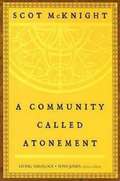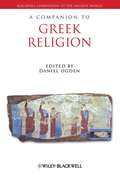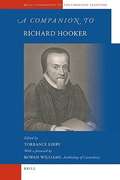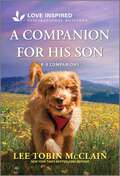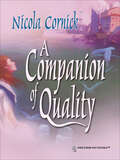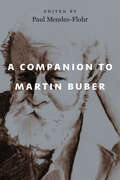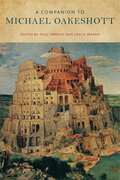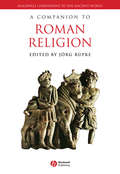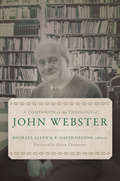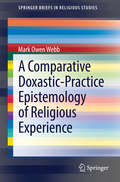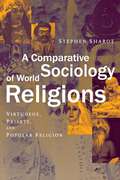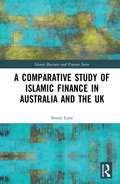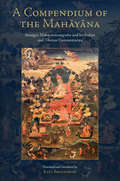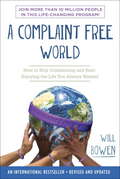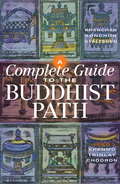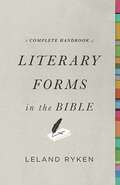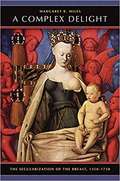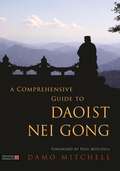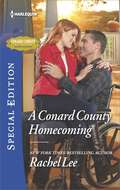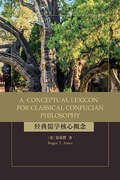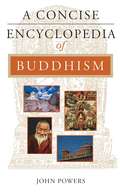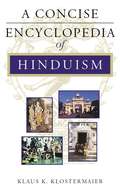- Table View
- List View
A Community Called Atonement: Living Theology (Living Theology)
by Scot McKnightOver the centuries the church developed a number of metaphors, such as penal substitution or the ransom theory, to speak about Christ's death on the cross and the theological concept of the atonement. Yet too often, says Scot McKnight, Christians have held to the supremacy of one metaphor over against the others, to their detriment. He argues instead that to plumb the rich theological depths of the atonement, we must consider all the metaphors of atonement and ask whether they each serve a larger purpose.A Community Called Atonement is a constructive theology that not only values the church's atonement metaphors but also asserts that the atonement fundamentally shapes the life of the Christian and of the church. That is, Christ identifies with humans to call us into a community that reflects God's love (the church)--but that community then has the responsibility to offer God's love to others through missional practices of justice and fellowship, living out its life together as the story of God's reconciliation. Scot McKnight thus offers an accessible, thought-provoking theology of atonement that engages the concerns of those in the emerging church conversation and will be of interest to all those in the church and academy who are listening in.
A Companion To Greek Religion (Blackwell Companions To The Ancient World #27)
by Daniel OgdenThis major addition to Blackwell’s Companions to the Ancient World series covers all aspects of religion in the ancient Greek world from the archaic, through the classical and into the Hellenistic period. Written by a panel of international experts Focuses on religious life as it was experienced by Greek men and women at different times and in different places Features major sections on local religious systems, sacred spaces and ritual, and the divine
A Companion To Richard Hooker (Brill's Companions To The Christian Tradition #8)
by Rowan Williams Torrance KirbyRichard Hooker was a learned philosophical theologian and engaged polemicist of the later sixteenth century who explained and defended the Elizabethan religious and political settlement, and shaped definitively the self-understanding of the English ecclesiastical establishment for centuries to come. This Companion to Richard Hooker brings together a representative body of contributors with a view to offering a summary of the current state of scholarly debate and a synthesis of emerging trends in criticism. Contributions to this volume reflect the major current trends of scholarly opinion on Hooker's place within the mainstream of Protestant reform. This Companion aims to provide a comprehensive and systematic introduction to Richard Hooker's life, works, thought, reputation, and influence.
A Companion for Christmas: An Uplifting Inspirational Romance (K-9 Companions #16)
by Lee Tobin McClainA family secret… Could be an unexpected Christmas gift. To escape the small-town gossip around her broken engagement, Kelly Walsh plans to house-sit alone with her therapy dog, Pokey—not spend the holidays with her late sister&’s ex-boyfriend. But when Alec Wilkins and his daughter arrive on her doorstep, Kelly can&’t turn them away. Soon the temporary arrangement has Kelly wishing for more. Only, Alec has a secret that could change everything… From Love Inspired: Uplifting stories of faith, forgiveness and hope.K-9 Companions Book 1: Their Unbreakable Bond by Deb KastnerBook 2: Finding Her Way Back by Lisa CarterBook 3: The Veteran's Vow by Jill LynnBook 4: Her Easter Prayer by Lee Tobin McClainBook 5: Earning Her Trust by Brenda MintonBook 6: Guarding His Secret by Jill KemererBook 7: An Unlikely Alliance by Toni ShilohBook 9: A Reason to Stay by Deb KastnerBook 10: The Veteran's Holiday Home by Lee Tobin McClainBook 11: An Alaskan Christmas Promise by Belle CalhouneBook 12: A Steadfast Companion by Myra JohnsonBook 14: A Friend to Trust by Lee Tobin McClainBook 15: Her Alaskan Companion by Heidi McCahanBook 16: A Companion for Christmas by Lee Tobin McClainBook 17: Her Christmas Healing by Mindy ObenhausBook 18: Finding Their Way Back by Jenna MindelBook 19: Their Inseparable Bond by Jill Weatherholt
A Companion for His Son: An Uplifting Inspirational Romance (K-9 Companions #23)
by Lee Tobin McClain&“Enticing, heartwarming, and inspiring, you won&’t want to miss this wholesome and uplifting story of compassion, grace, and second chances.&” --Amazon reviewer on A Companion for ChristmasProtecting his son is his priority.Is there room for more?Nate Constantine would do anything to provide for his son with autism—even if that means starting over in small-town Holiday Point. Or abandoning his best-laid plans and asking Freddie&’s kindergarten teacher, Olivia Bell, for extra help with Freddie and his service dog, Scooby. She could be just what Freddie and his father need…but only if Olivia and Nate are willing to risk their hearts.&“Lee Tobin McClain&’s books make my heart sing.&” —Debbie Macomber, New York Times bestselling authorFrom Love Inspired: Uplifting stories of faith, forgiveness and hope.K-9 CompanionsBook 1: Their Unbreakable Bond by Deb KastnerBook 2: Finding Her Way Back by Lisa CarterBook 3: The Veteran's Vow by Jill LynnBook 4: Her Easter Prayer by Lee Tobin McClainBook 5: Earning Her Trust by Brenda MintonBook 6: Guarding His Secret by Jill KemererBook 7: An Unlikely Alliance by Toni ShilohBook 9: A Reason to Stay by Deb KastnerBook 10: The Veteran's Holiday Home by Lee Tobin McClainBook 11: An Alaskan Christmas Promise by Belle CalhouneBook 12: A Steadfast Companion by Myra JohnsonBook 14: A Friend to Trust by Lee Tobin McClainBook 15: Her Alaskan Companion by Heidi McCahanBook 16: A Companion for Christmas by Lee Tobin McClainBook 17: Her Christmas Healing by Mindy ObenhausBook 18: Finding Their Way Back by Jenna MindelBook 19: Their Inseparable Bond by Jill WeatherholtBook 20: Bonding with the Babies by Deb KastnerBook 21: Her Son's Faithful Companion by Jill WeatherholtBook 22: Training the K-9 Companion by Jill KemererBook 23: A Companion for His Son by Lee Tobin McClainBook 24: Her Loyal Companion by Heidi MainBook 25: A K-9 Christmas Reunion by Lisa CarterBook 26: His Christmas Salvation by Lee Tobin McClain
A Companion of Quality
by Nicola CornickA young woman disappears. A husband is suspected of murder. Stirringtimes for all the neighborhood.When Captain Lewis Brabant returned from the open sea, all thought hemeant to choose a bride. As eligible females readied to meet thedashing Captain Brabant, one woman of modest means stood away from thecrowd and let her friend have a go at the bachelor. In fact, MissCaroline Whiston had no expectations, since she was a lady'scompanion. But no sooner had the two met than they felt a headyattraction, despite the odds. Would Captain Lewis defy convention andfall in love with this beguiling companion…?
A Companion to Martin Buber
by Paul Mendes-FlohrA definitive, international guide to the thought of the most important twentieth-century Jewish philosopher. In his 1923 essay, I and Thou, the philosopher, theologian, and activist Martin Buber introduced a philosophy of dialogue that achieved a global, interdisciplinary resonance. For Buber, dialogue was more than a conversation; dialogue discloses something essential about our orientation and our lives with one another. This companion assembles twenty-six scholars from a dozen countries to explore Buber’s international reputation and legacy in education, interfaith relations, Judaism, philosophy, politics, and psychology. The result is an essential guide to one of the most influential Jewish thinkers of the twentieth century.
A Companion to Michael Oakeshott
by Paul Franco Leslie MarshMichael Oakeshott has long been recognized as one of the most important political philosophers of the twentieth century, but until now no single volume has been able to examine all the facets of his wide-ranging philosophy with sufficient depth, expertise, and authority. The essays collected here cover all aspects of Oakeshott’s thought, from his theory of knowledge and philosophies of history, religion, art, and education to his reflections on morality, politics, and law. Aside from the editors, the contributors are Corey Abel, David Boucher, Elizabeth Corey, Robert Devigne, Timothy Fuller, Steven Gerencser, Robert Grant, Noel Malcolm, Kenneth McIntyre, Kenneth Minogue, Noël O’Sullivan, Geoffrey Thomas, and Martyn Thompson.
A Companion to Michael Oakeshott
by Paul Franco, Leslie MarshMichael Oakeshott has long been recognized as one of the most important political philosophers of the twentieth century, but until now no single volume has been able to examine all the facets of his wide-ranging philosophy with sufficient depth, expertise, and authority. The essays collected here cover all aspects of Oakeshott’s thought, from his theory of knowledge and philosophies of history, religion, art, and education to his reflections on morality, politics, and law. Aside from the editors, the contributors are Corey Abel, David Boucher, Elizabeth Corey, Robert Devigne, Timothy Fuller, Steven Gerencser, Robert Grant, Noel Malcolm, Kenneth McIntyre, Kenneth Minogue, Noël O’Sullivan, Geoffrey Thomas, and Martyn Thompson.
A Companion to Roman Religion (Blackwell Companions to the Ancient World #78)
by Jörg RüpkeA comprehensive treatment of the significant symbols and institutions of Roman religion, this companion places the various religious symbols, discourses, and practices, including Judaism and Christianity, into a larger framework to reveal the sprawling landscape of the Roman religion. An innovative introduction to Roman religion Approaches the field with a focus on the human-figures instead of the gods Analyzes religious changes from the eighth century BC to the fourth century AD Offers the first history of religious motifs on coins and household/everyday utensils Presents Roman religion within its cultural, social, and historical contexts
A Companion to the Theology of John Webster
by Michael Allen and R. David Nelson, editorsAn overview and analysis of John Webster&’s seminal contributions to Christian theology At the time of his death, John Webster was widely hailed as one of the leading Christian theologians in the world. Over the course of three decades, he produced groundbreaking studies on the theologies of Eberhard Jüngel and Karl Barth and, especially since the turn of the millennium, numerous books and essays on various themes in Christian dogmatics. He then intended to write an encyclopedic systematic theology—a project he was unable to complete. No substitute is possible for that lost opus, but the contributors offer this volume as an homage to Webster and an aid to those who want to learn from him. A Companion to the Theology of John Webster begins with an introductory section on Webster&’s theological development, then continues into an extensive overview of Webster&’s contributions to contemporary discussions of particular doctrines. An epilogue suggests how Webster&’s theology might have unfolded had he lived longer and imagines the continuing influence of his work on the enterprise of Christian dogmatics. Readers hoping to understand the legacy of this great theologian, and also those eager for fresh insights into the present state and future trajectories of contemporary Protestantism, will find much to offer here.
A Comparative Doxastic-Practice Epistemology of Religious Experience (SpringerBriefs in Religious Studies #2)
by Mark Owen WebbThis book takes a theoretical enterprise in Christian philosophy of religion and applies it to Buddhism, thus defending Buddhism and presenting it favorably in comparison. Chapters explore how the claims of both Christianity and Theravada Buddhism rest on people's experiences, so the question as to which claimants to religious knowledge are right rests on the evidential value of those experiences. The book examines mysticism and ways to understand what goes on in religious experiences, helping us to understand whether it is good grounds for religious belief. The author argues that religious language in both Christian and Buddhist traditions is intelligible as factual discourse, and so reports of mystical experience are true or false. The book contends that those experiences can be fruitfully thought of as perceptual in kind and that they are therefore good prima facie grounds for religious belief, in the absence of defeating conditions. The work goes on to explore Christian and Buddhist testimony and how the likelihood of self-deception, self-delusion, imaginative elaboration and the like constitutes a defeating condition. It is shown that this defeater has less scope for operation in the Buddhist case than in the Christian case, and therefore Theravada Buddhism is better grounded. This work will appeal to students and scholars of philosophy and philosophy of religion, and those interested in the study of religious experience.
A Comparative Sociology of World Religions: Virtuosi, Priests, and Popular Religion
by Stephen SharotA Sociology of World Religions presents a comparative analysis of the world's religions, focusing on the differences and interrelationships between religious elites and lay masses. In each case the volume contextualizes how the relationships between these two religious forms fit within, and are influenced by, the wider socio-political environment. After introducing the book's major themes, the volume introduces and builds upon an analysis of Weber's model of religious action, drawing on Durkheim, Marxist scholars, and the work of contemporary sociologists and anthropolgists. The following chapters each focus on major religious cultures, including Hinduism, Buddhism, Catholicism, Protestantism, Islam, Judaism, and the religions of China and Japan. This ambitious project is the first to offer a comparison of the popular, or folk, forms of religion around the world. Sharot's accessible introductions to each of the world religions, synthesizing a vast literature on popular religion from sociology, anthropology, and historians of religion, make the project ideal for course use. His comparative approach and original analyses will prove rewarding even for experts on each of the world religions.
A Comparative Study of Islamic Finance in Australia and the UK (Islamic Business and Finance Series)
by Imran LumThis book provides valuable insights into the practical challenges faced by the nascent Islamic finance industry and compares the Australian experience to developments in the UK. It contributes to a greater understanding of how Muslims living as a minority in Australia and the UK negotiate Islamic doctrine in secular societies by focusing on one aspect of this negotiation, namely the prohibition of ribā. There is little debate in the Islamic tradition on the prohibition of ribā. The differences, however, lie in the interpretation of ribā and the question of how Muslims live in a society that is heavily reliant on interest and conventional banking, yet at the same time adhere to Islamic guidelines. Through the words of religious leaders, Muslim professionals and university students, Imran Lum provides real accounts of how Muslims in Australia and the UK practically deal with conventional banking and finance products such as home loans, savings accounts and credit cards. He also explores Muslim attitudes towards Islamic finance and queries whether religion is the sole determining factor when it comes to its uptake. Drawing on his own unique experience as a practitioner responsible for growing an Islamic business in a conventional bank, Lum provides a firsthand account of the complexities associated with structuring Islamic finance products that are not only sharia compliant but also competitive in a non-Muslim jurisdiction. Using ṣukūk bonds as a case study, he highlights the tangible and non-tangible barriers to product development, such as tax and regulatory requirements and the rise of Islamophobia. Combining academic and industry experience, Lum unpacks the relationship of Islamic finance with Muslim identity construction in the West and how certain modalities of religiosity can lead to an uptake of Islamic finance, while others can lead toits rejection.
A Compendium of the Mahayana: Asanga's Mahayanasamgraha and Its Indian and Tibetan Commentaries (Tsadra)
by AsangaThe first complete English translation of Asanga's Mahayanasamgraha, the most important and comprehensive Indian Yogacara text, and all its available Indian commentaries.The Mahāyānasaṃgraha, published here with its Indian and Tibetan commentaries in three volumes, presents virtually everything anybody might want to know about the Yogācāra School of mahāyāna Buddhism. It discusses in detail the nature and operation of the eight kinds of consciousness, the often-misunderstood notion of “mind only” (cittamātra), dependent origination, the cultivation of the path and its fruition in terms of the four wisdoms, and the three bodies (kāyas) of a buddha.Volume 1 presents the translation of the Mahāyānasaṃgraha along with a commentary by Vasubandhu. The introduction gives an overview of the text and its Indian and Tibetan commentaries, and explains in detail two crucial elements of the Yogācāra view: the ālaya-consciousness and the afflicted mind (kliṣṭamanas).Volume 2 presents translations of the commentary by Asvabhāva and an anonymous Indian commentary on the first chapter of the text. These translations are supplemented in the endnotes by excerpts from Tibetan commentaries and related passages in other Indian and Chinese Yogācāra works.Volume 3 includes appendices with excerpts from other Indian and Chinese Yogācāra texts and supplementary materials on major Yogācāra topics in the Mahāyānasaṃgraha.
A Complaint Free World: How To Stop Complaining And Start Enjoying The Life You Always Wanted
by Will Bowen"A Complaint Free World is an engaging, enjoyable, easy-to-read reminder that the only permanent, constructive changes you can make in the world are the changes that you make in yourself."-Gary Zukav, author of The Seat of the Soul and Soul to Soul A SIMPLE PLAN... A LIFE-CHANGING RESULT... A HAPPIER LIFE ·What exactly is a complaint? (Chapter 1) ·Why is complaining destructive? (Chapters 2-3) ·How can I get others around me to stop complaining? (Chapter 3) ·How can we affect social change if we don't complain? (Chapter 5) ·Why is it so hard to stop complaining? (Chapters 4-6) ·What happens once I no longer complain? (Chapter 8) You may have pondered these questions yourself. Since the Complaint Free program began, Will Bowen has received hundreds of calls, letters and emails asking these and other important questions. In A Complaint Free World: How to Stop Complaining and Start Enjoying the Life You Always Wanted, he provides practical answers and includes inspiring and touching stories from people just like you who have transformed their lives by becoming Complaint Free. Over 6 million people in more than 80 countries have taken the Complaint Free challenge and their lives are a testament to the positive effects of this simple idea. Find out how forming the simple habit of not complaining can transform your health, relationships, career and life. In your hands, you hold the secret to transforming your life. Big words? Yes, but this is a plan that has already proven itself with millions of people around the world. Pastor Will Bowen developed the life-changing A Complaint Free World plan based on the simple idea that good things will happen for you in abundance if you can just leave your grumbling behind. In a Sunday-morning sermon, Will told his congregation he wanted to make the world a complaint-free zone and, to prove he was serious, he passed out purple bracelets to each church member and offered them a challenge. "If you catch yourself complaining, take the bracelet and move it to the other wrist." Now, less than a year later, more than six million people have taken up the challenge, trying to go twenty-one consecutive days without complaining, criticizing, or gossiping, and in so doing, forming a new, positive habit. By changing your words, you can change your thoughts and then begin to create your life by design. People have shared stories with Will of chronic pain relieved, relationships healed, careers improved, and becoming an overall happier person. Less pain, improved health, satisfying relationships, a better job, being more serene and joyous--sound good? It's not only possible, it's probable. Consciously striving to reformat your mental hard drive is not easy, but you can start now by using the steps Bowen presents here. In this book, you can learn what constitutes a complaint, why we complain, what benefits we think we receive from complaining, how complaining is destructive to our lives, and how we can get others around us to stop complaining. You will learn the steps to eradicating this poisonous form of expression from your life. If you stay with it, you will find that not only will you not complain, but others around you will cease to do so as well. In a short period of time, you can have the life you've always dreamed of having.From the Hardcover edition.
A Complete Guide to the Buddhist Path
by Khenchen Konchog Gyaltshen"Buddhist teachings provide numerous methods for bringing greater meaning and happiness into our lives and into our relationships with others. In A Complete Guide to the Buddhist Path, Khenchen Konchog Gyaltshen Rinpoche reveals these methods in direct, vibrant, down-to-earth language. At the core of this work lies The Jewel Treasury of Advice, a text composed by Drikung Bhande Dharmaradza (1704-1754), the reincarnation of Drikung Dharmakirti. Khenchen Rinpoche interprets these ancient teachings with compassion, humor, and a keen awareness for their relevance in contemporary Western life. Those who sincerely want to study and practice the Buddha's teachings will find this an indispensable guide. "
A Complete Handbook of Literary Forms in the Bible
by Leland RykenA renowned literary scholar explains more than 250 literary forms found throughout Scripture in this alphabetically arranged handbook, offering succinct definitions, helpful illustrations, and key biblical references.
A Complex Delight: The Secularization Of The Breast, 1350-1750
by Margaret R. Miles Vanessa LyonLooking at painting and sculpture from the fourteenth through the eighteenth centuries, this provocative work focuses on the symbolism of the female breast to open a dazzling interpretive view of Western European history over four centuries. Margaret R. Miles finds that while in 1350 the Virgin's bare breast represented nourishment and loving care―God's provision for the Christian―by 1750, artistic representations of the breast were either erotic or medical. The breast had lost its meaning as a religious symbol. But how did the breast, and nakedness more generally, lose the ability to represent human bodies as site and symbol of religious subjectivity and commitment? To explore this phenomenon, Miles engages in a wide-ranging investigation of the social, cultural, and religious circumstances within which a religious symbol came to be thoroughly "mastered" by erotic and medical meanings. What emerges is a nuanced understanding of the location of power in early modern Western Europe, of how the lives of women changed over this period, of how art reveals and helps to construct religious meaning, and of how modern Christianity's attitude toward bodies was shaped.
A Complicated Kindness
by Miriam ToewsFrom book jacket... "We're Mennonites. As far as I know, we are the most embarrassing sub-sect of people to belong to if you're a teenager. Five hundred years ago in Europe a man called Menno Simons set off to do his own peculiar religious thing....Imagine the least well-adjusted kid in your school starting a breakaway clique of people whose manifesto includes a ban on the media, dancing, smoking, temperate climates, movies, drinking, rock n' roll, having sex for fun, swimming, make-up, jewelry, playing pool, going to cities, or staying up past nine o'clock. That was Menno all over. Thanks a lot, Menno!" Welcome to the world of Nomi Nickel, a tough, wry young woman trapped in a small Mennonite town that seeks to set her on the path to righteousness and smother her at the same time. In this work of fierce originality and brilliance, Miriam Toews explores the intricate binds of family, and the forces that tear them apart. "Half of our family, the better-looking half, is missing," Nomi tells us at the beginning of A Complicated Kindness. Left alone with her father Ray, her days are spent piecing together the reasons her mother, Trudie, and her sister, Natasha, have gone missing, and trying to figure out what she can do to avoid a career at Happy Family Farms, a chicken abattoir on the outskirts of East Village - not the neighborhood in Manhattan where Nomi most wants to live, but the small town in southern Manitoba. Boasting such attractions as a Main Street that goes nowhere and a replica pioneer village that hearkens back to the days when life was simple, and citizens who didn't live by the book were routinely shunned. East Village is ministered by the fiercely pious Hans, or as Nomi calls her uncle, The Mouth. As Nomi gets to the bottom of the truth behind her mother's and sister's disappearances, she finds herself on a bitter collision course with her uncle and the only community she has ever known. But one startling act of defiance brings the novel to its shattering conclusion, and Miriam Toews reveals herself as a master of storytelling at the height of her power.
A Comprehensive Guide to Daoist Nei Gong
by Damo MitchellA complete and detailed explanation of the Nei Gong process. Explaining the philosophy at the core of Daoist Nei Gong, and illustrated with detailed figures throughout, this fascinating text will be of interest to practitioners of Qi Gong, martial arts and practitioners, and to anyone interested in Eastern philosophy.
A Conard County Homecoming: A Conard County Homecoming How To Train A Cowboy Falling For The Right Brother (Conard County: The Next Generation #34)
by Rachel LeeMAN'S-AND WOMAN'S?-BEST FRIEND Conard County's returning war hero is a world away from the popular high school athlete Ashley Granger remembers. Zane McLaren doesn't want any fanfare-he doesn't want any human contact at all. But it seems Zane's affectionate golden retriever has other ideas about the decorated soldier and the teacher next door! Wounded in battle, Zane wants only to be left alone. He doesn't need anyone's pity, especially his outgoing, dog-loving neighbor's. Because it isn't just Ashley's legendary apple pie that's tempting Zane to quit hiding from life. Suddenly the Purple Heart recipient is having a hard time keeping his own heart under wraps. Has he found the woman who can help him heal the past and build a loving future together?
A Conceptual Lexicon for Classical Confucian Philosophy (SUNY series in Chinese Philosophy and Culture)
by Roger T. AmesUses a comparative hermeneutical method to explain the most important terms in the classical Confucian philosophical texts, in an effort to allow the tradition to speak on its own terms.Over the years, Roger T. Ames and his collaborators have consistently argued for a processual understanding of Chinese natural cosmology made explicit in the Book of Changes. It is this way of thinking, captured in its own interpretive context with the expression "continuities in change" (biantong) that has shaped the grammar of the Chinese language and informs the key philosophical vocabulary of Confucian philosophy. Over the past several centuries of cultural encounter, the formula established by the early missionaries for the translation of classical Chinese texts into Western languages has resulted in a Christian conversion of Confucian texts that is still very much with us today. And more recently, the invention of a new Chinese language to synchronize East Asian cultures with Western modernity has become another obstacle in our reading of the Confucian canons. This volume, a companion volume to A Sourcebook in Classical Confucian Philosophy, employs a comparative hermeneutical method in an attempt to explain the Confucian terms of art and to take the Confucian tradition on its own terms.
A Concise Encyclopedia of Buddhism (Concise Encyclopedias)
by John PowersFrom the teachings of the early masters to the growth of the tradition in the West, this authoritative new reference tool contains over 900 entries supplying information on all the key doctrines, practices, and figures central to Buddhism.
A Concise Encyclopedia of Hinduism (Concise Encyclopedia Of World Faiths Ser.)
by Klaus K. KlostermaierWith entries on everything from Manu to Gandhi and the Ramesvaram to the Himalayas, this is an invaluable reference book.
